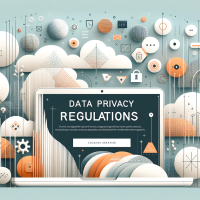
Data privacy is a hot topic in the marketing industry, especially in Canada, where new and existing regulations are changing the way businesses collect, use, and disclose personal information. Data privacy is not only a legal obligation, but also a strategic advantage for marketers who want to build trust, loyalty, and differentiation with their customers.
In this blog post, we will explore how to avoid penalties and fines for violating data privacy laws, and how to leverage data privacy as a marketing opportunity and a competitive edge. We will cover the following points:
- The main data privacy laws and regulations in Canada and their implications for marketers
- The benefits of data privacy for both customers and businesses
- The best practices and tips for collecting, using, and protecting personal data in a compliant and ethical way
- The emerging trends and opportunities for data-driven marketing in a privacy-conscious world
The Main Data Privacy Laws and Regulations in Canada and Their Implications for Marketers
Canada has two federal privacy laws that are enforced by the Office of the Privacy Commissioner of Canada (OPC): the Privacy Act, which covers how the federal government handles personal information, and the Personal Information Protection and Electronic Documents Act (PIPEDA), which covers how businesses handle personal information1.
PIPEDA applies to the collection, use, and disclosure of personal information in the course of commercial activities, and contains restrictions relating to electronic address harvesting and e-marketing2. PIPEDA also sets out 10 principles that businesses must follow, such as obtaining meaningful consent, limiting the collection and use of personal information to reasonable purposes, ensuring the accuracy and security of personal information, and providing access and accountability to individuals1.
In addition to PIPEDA, some provinces have their own privacy laws that may apply to certain sectors or activities, such as health, employment, or public sector1. For example, British Columbia, Alberta, and Quebec have their own private sector privacy laws that are substantially similar to PIPEDA, and Ontario, New Brunswick, Newfoundland and Labrador, and Nova Scotia have their own health information privacy laws1.
Moreover, Canada has recently introduced a new data privacy bill, the Consumer Privacy Protection Act (CPPA), which aims to modernize and strengthen the data protection framework in Canada3. The CPPA would replace PIPEDA and introduce new rights and obligations for both consumers and businesses, such as:
- The right to data portability, which allows consumers to transfer their personal information from one organization to another
- The right to erasure, which allows consumers to request the deletion of their personal information
- The right to withdraw or modify consent, which allows consumers to change their mind about how their personal information is used
- The obligation to obtain explicit consent, which requires businesses to clearly explain the purposes and consequences of collecting, using, and disclosing personal information
- The obligation to implement a privacy management program, which requires businesses to establish policies and practices to ensure compliance with the CPPA
- The obligation to report breaches, which requires businesses to notify the OPC and affected individuals of any breach of security safeguards that poses a significant risk of harm
- The obligation to conduct privacy impact assessments, which requires businesses to evaluate the potential privacy risks and benefits of any new or modified data processing activity
The CPPA would also give the OPC more enforcement powers, such as the ability to issue orders, impose administrative monetary penalties, and recommend fines of up to 5% of global revenue or $25 million, whichever is greater, for the most serious offences3.
As you can see, data privacy laws and regulations in Canada are complex and evolving, and they have significant implications for marketers who collect, use, and disclose personal information. Failing to comply with these laws and regulations can result in legal actions, reputational damages, customer losses, and financial penalties. Therefore, it is essential for marketers to stay informed and updated on the data privacy landscape in Canada, and to adopt a proactive and responsible approach to data privacy.
The Benefits of Data Privacy for Both Customers and Businesses
Data privacy is not only a legal obligation, but also a strategic advantage for marketers who want to build trust, loyalty, and differentiation with their customers. Data privacy can benefit both customers and businesses in the following ways:
- For customers, data privacy means having more control, choice, and transparency over how their personal information is collected, used, and disclosed. Data privacy also means having more protection from data breaches, fraud, and identity theft, which can cause financial, emotional, and physical harm. Data privacy can enhance customer satisfaction, confidence, and loyalty, and can encourage customers to share more personal information with businesses that they trust.
- For businesses, data privacy means having more accurate, relevant, and valuable data on their customers, which can enable more personalized, targeted, and effective marketing strategies. Data privacy also means having more trust, reputation, and differentiation in the market, which can attract and retain more customers, and increase customer lifetime value. Data privacy can also foster more innovation, collaboration, and compliance, and can reduce the risks and costs of data breaches, fines, and lawsuits.
According to a survey by BCG and Google, 32% of marketers say that data privacy changes have had a positive impact on their marketing strategy over the past year, while only 10% say they have had a negative effect4. The survey also found that consumers are more willing to share their personal information with businesses that demonstrate their concern for data privacy, and that offer a clear value exchange for their data5.
Therefore, data privacy is not a threat, but an opportunity for marketers who want to create more value for their customers and their businesses.
The Best Practices and Tips for Collecting, Using, and Protecting Personal Data in a Compliant and Ethical Way
To leverage data privacy as a marketing opportunity and a competitive edge, marketers need to follow some best practices and tips for collecting, using, and protecting personal data in a compliant and ethical way. Here are some of them:
- Understand the data privacy laws and regulations that apply to your business, and keep up with the changes and updates. Consult with legal experts, privacy professionals, and industry associations to ensure compliance and alignment with the best practices and standards.
- Adopt a privacy-by-design approach, which means integrating data privacy principles and practices into every stage of your data processing activities, from planning to execution to evaluation. Conduct privacy impact assessments, implement privacy management programs, and use privacy-enhancing technologies to minimize the privacy risks and maximize the privacy benefits of your data processing activities.
- Obtain meaningful consent from your customers, and respect their choices and preferences. Explain clearly and transparently why, how, and where you collect, use, and disclose their personal information, and what are the benefits and risks for them. Offer them easy and accessible ways to withdraw or modify their consent, access or correct their personal information, or request its deletion or portability. Provide them with opt-in and opt-out options, and respect the do-not-track and do-not-sell requests.
- Limit the collection and use of personal information to reasonable and legitimate purposes, and avoid collecting or using personal information that is not necessary, relevant, or appropriate for your marketing objectives. Use data minimization, anonymization, and pseudonymization techniques to reduce the amount and sensitivity of personal information that you collect and use. Delete or destroy personal information that is no longer needed or required.
- Ensure the accuracy and quality of personal information that you collect and use, and update it regularly to reflect the changes and preferences of your customers. Verify the sources and methods of data collection, and use data validation, cleaning, and enrichment tools to improve the data quality and reliability. Avoid using outdated, inaccurate, or incomplete data that can lead to errors, inefficiencies, or harms.
- Protect the security and confidentiality of personal information that you collect and use, and prevent unauthorized or unlawful access, use, disclosure, modification, or destruction of personal information. Use encryption, authentication, access control, firewall, and backup technologies to safeguard personal information from internal and external threats. Report and respond to any breach of security safeguards that poses a significant risk of harm to your customers or your business.
- Be accountable and transparent for your data privacy practices, and demonstrate your compliance and performance to your customers, regulators, and stakeholders. Document and communicate your data privacy policies and procedures, and provide clear and accessible channels for your customers to contact you or complain about your data privacy practices. Monitor and audit your data privacy practices, and measure and report your data privacy outcomes and impacts.
CITATION
1. priv.gc.ca2. priv.gc.ca3. blog.didomi.io4. blog.hubspot.com5. bcg.com6. thecma.ca7. cmaj.ca8. priv.gc.ca9. dataguidance.com10. iclg.com11. forbes.com12. enzuzo.com13. integrate.io









